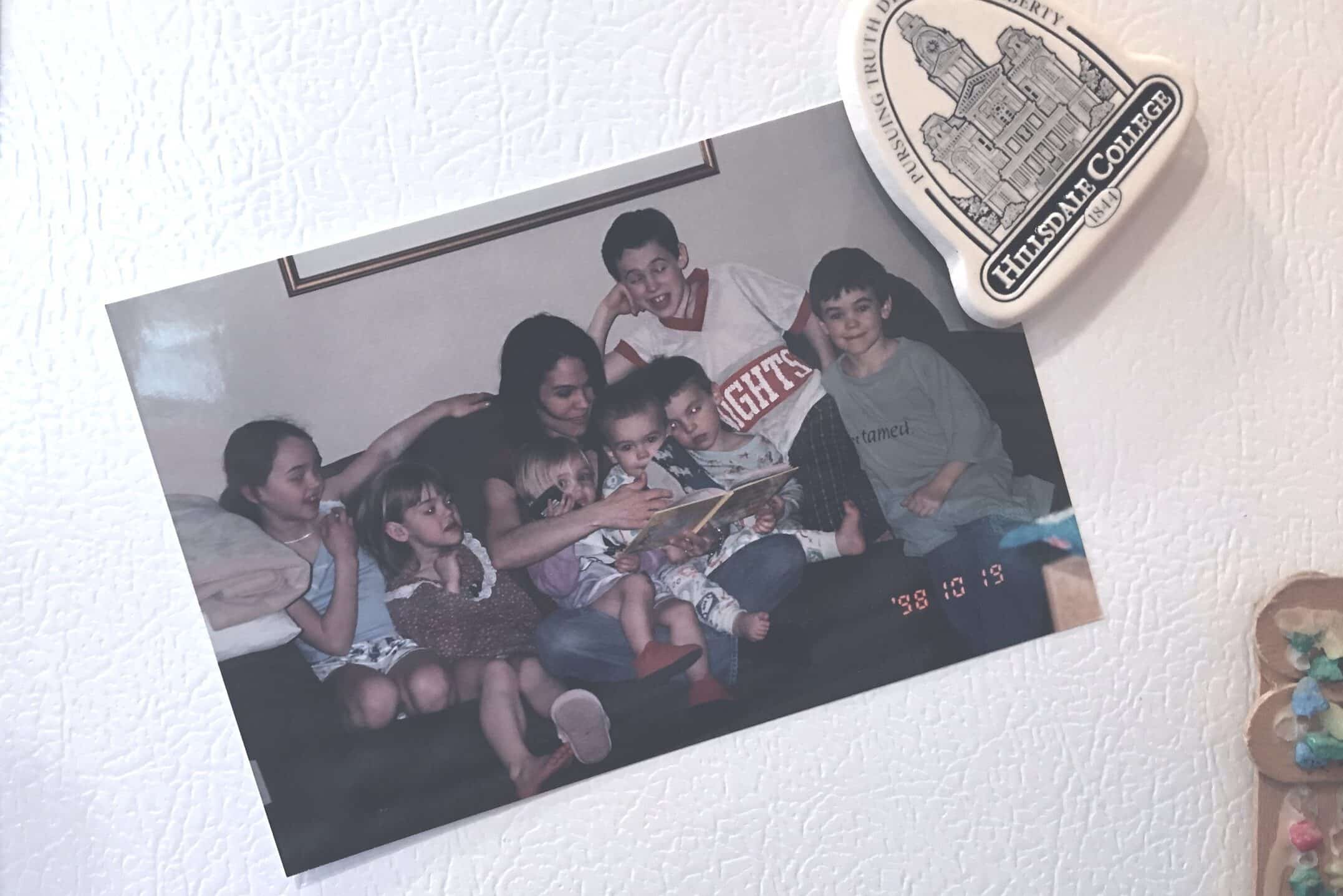
The Hovel
“Hard by here is a hovel. Some friendship will it lend you ‘gainst the tempest.” – King Lear
“Literary experience heals the wound, without undermining the privilege, of individuality.”
C.S. Lewis, An Experiment in Criticism
The literary tradition imaginatively chronicles the experience of sinners and sufferers through the ages. When engaged with, it both enlarges our own limited perspective so we may see compassionately through the eyes of others, and also holds up a mirror to human nature – in particular, our weakness – thereby highlighting our need for true relationship. CenterForLit’s blog, The Hovel, aims to act as a doorway to this kind of community by facilitating life-giving conversation about the reading experience, literary education, and literature’s great ideas.
-

An Open Letter to the New COVID-19 Homeschooler
As I sat rubbing sleep from my eyes this morning, wondering what new coronavirus mandates might come to disrupt our routines today, I found myself on social media. The comments and videos that most affected me were those from you moms who recently discovered that you were homeschooling by government mandate. You look tired, bewildered, and overwhelmed. You look like beginning swimmers who have been thrown in the deep end of the swimming pool – with your infants, toddlers, and teens in tow. My heart goes out to you…
-

Penitence and Pain: Donne’s Holy Sonnet III
In Holy Sonnet III, Donne finds himself in a state of violent and prolonged grief, yet unable to cry. He marks the tortuous effects of this condition, even as he admits responsibility for it. Speaking of tears as if they spring from a limited cask, he creates an image of his irresponsible and wasteful usage, which has left him with a water shortage when he most has need of the relief such “showers of rain” would afford him. He remembers the many tears he spent in his pursuit of idolatry and marks them wasted. And yet he cried and sighed…
-

Authorial Intent and Christian Education
The use of language in any context rests on a single and essential tenet: words mean. And not only that, they mean something particularly. When anyone writes or speaks, they trust utterly, even if unconsciously, that they can, to someone who speaks their language, be understood. The next obvious question is, who decides what words mean? Here, we have two options…
-

Rhetorical Arguments and Private Desperation: Donne’s Holy Sonnet II
Donne begins this meditative sonnet by giving himself up to God, an act which, he maintains, feels appropriate in consideration of the various titles he possesses and their diverse implications. “As due by many titles I resign / Myself to thee, O God…” He catalogues these appellations: First, he is a creature of God, made by and for Him (“…first I was made / By thee, and for thee…”). Next, he is a redeemed one, re-possessed by Jesus’ blood (“…and when I was decayed / Thy blood bought that, the which before was thine…”). He is God’s son, made for…
-

A Meditation on Lite Reading
I was recently enjoying a coffee with my dear friend and sister, Emily Andrews, and our conversation took a literary turn. Now before you get all excited and prime your pipes for some serious intellectual pontificating, I’ll warn you that my recent forays into the world of classroom teaching have left my mind mushy. I’m good for nothing when it comes to “The Greats” these days. My nightstand is a hapless home to stacks of penny reads and quick reads and trash reads and literary “junk food,” but Emily assured me that there may be those of you out there…
-

Truth and Beauty in Peter Rabbit
In An Experiment in Criticism, C. S. Lewis suggests that every work of literature is both Logos (something said) and Poiema (something made). What he means is that each work not only communicates an idea, but does so via form and technique; it is a creation of the hands, not just of the mind. “As Logos,” Lewis writes, “it tells a story…As Poeima, by its aural beauties and also by the balance and contrast and the unified multiplicity of its successive parts, it is an objet d’art, a thing shaped so as to give great satisfaction” (Lewis 132)…
-

Thanksgiving is Not a Duty
Do you ever feel guilty at Thanksgiving because you’re not thankful enough? Do you ever evaluate your degree of thankfulness and find yourself wanting? Does it sometimes seem like thankfulness is a duty, just one more thing that is expected of you that you are failing to perform adequately Me, too, all the time….
-

Iron Hearts and Metaphysical Magnets: Donne’s Image of Man and God
“Thou hast made me, and shall thy work decay?” questions Donne in this, his first Holy Sonnet. Using a poetic form that lends itself to question and answer, the poet poses the problem of personal sin even as he petitions his Creator for a solution. Will You allow Your own work to be compromised and destroyed? he asks. This provocative question recalls scriptures which proclaim the enduring nature of God’s work, like this one from Ecclesiastes 3:14: “I know that whatever God does, it shall be forever. Nothing can be added to it, and nothing taken from it. God does…
-

A New (Old) Case for the Language Arts
Here’s a rule that cannot possibly be overstated: language proficiency is the single most important component of an education, period. If your students do not learn to use the right words, they will become prisoners of the wrong ones. This applies to any subject, to any activity, and to any relationship. Give your students the tools of language, and their education is complete. Fail in this, and it can never really begin…
-

Literary Reading in the Gospel of Luke
There’s a passage in the Gospel of Luke to which I have historically applied some bad reading habits. It’s the scene where Jesus compares his listeners to children calling out to one another in the street, saying “We played the flute for you, and you did not dance; we sang a dirge, and you did not weep.” (7:32) To be honest, I usually just keep on reading right past this verse and move on to more accessible material…
-

On Starting the Year Exhausted
I will admit, when I sat down last week to teach my first class of the year, I was feeling less than enthusiastic. As you may have heard elsewhere, this was a big summer for the CenterForLit crew. I spent long days bent over my laptop in a hidey hole, fiddling with fonts and web design for our new CenterForLit Schools project. By the time I exited my dark den, eyes blinking in the harsh light, August had rolled to a close and it was time to take up the teacher’s mantle again. On the one hand I was grateful…
-

Of Books and Boundaries
For as long as I can remember, books have been my companions. I carried them to grocery stores, to doctors’ offices, to school, and to work. I toted tomes to movie theaters, to beaches, to park benches, and to parties. I never go anywhere without them. As a young girl, I remember reading while walking with my mother through the aisles of the local grocery store, my mom telling me to put the book away before I ran into someone…
-

The Quest for Success and “Enoughness” Part 2
Australian author Mem Fox illustrates the effects of the little “l” law in the parent and child relationship in a children’s book entitled Harriet, You’ll Drive Me Wild. With short sentences illustrated by Marla Frazee in pencil and transparent ink, Fox tells the story of young Harriet, whose childish antics exasperate her mother, who “doesn’t like to yell,” by degrees until she reaches the boiling point: “There was a terrible silence. Then Harriet’s mother began to yell. She yelled and yelled and yelled.” I imagine most of us can identify with Harriet’s mom…
-

The Quest for Success and “Enoughness” Part 1
We live in a performance culture. The push to succeed begins in the cradle and dogs us to the grave. Many parents feel this deeply. A recent article I read recounts a sandbox conversation between two moms, one with preschoolers and one who had only recently discovered she was expecting: “You’re expecting?! How wonderful! Now, you’ve registered for pre-school already, right? You’ll need to get right on that. The waiting list is two years at all the right preschools, and if you don’t get into a good one, then any chance of getting into the right prep school is ruined…
-

The History of Us
When my kiddos were between the ages of 2 and 11, and the basket beside our fireplace burgeoned with library books, a good friend from church set me a task: How can a homeschool mom with a bundle of children (and all the work that comes along with them) go about teaching the classics, especially if she didn’t get a great books education herself? At the time, my own six children were reading the “good books;” the great books were yet before them…
-

The Apostle Paul on Getting an A
by Ian Andrews The school year at CenterForLit has taken flight, which means the hustle and bustle involved in administrating
-

Incredibles 2: Grace for the Technology Age
At 12-years-old, the release of Pixar’s original Incredibles hit me right between the eyes. Young enough for cartoons, old enough to understand some deeper implications of the story, I imagine I was at the center of their target audience. Certainly the question of Syndrome, the piece’s villain, was one I was beginning to ask myself as a budding teenager: if everyone is special, isn’t it true that no one is? How can I be uniquely valuable in a world where everyone is also uniquely valuable? It is a legitimate question, not just for children…
-

What Should a Student Read Before Going to College?
I’m often asked, “What does my high schooler need to read before college?” – as though there were one or two novels out of the hundreds and hundreds of spectacular works in the Western tradition without which any primary educational journey would be void of meaning. I don’t mean to ridicule the impulse to choose wisely what we offer our students. We clearly should. But I do sense an undercurrent of misunderstanding about the educational project in questions like these…
-

Self-Judgment and Hamlet’s Mutiny
My last blog post on The Hovel is dated April 17, 2017 – over one year ago. There are plenty of reasons and justifications for my silence: I’ve been busy working on more pressing projects, Ian and I moved across the country again, we bought our first house, etc., etc. If I’m honest, though, there’s one sad underlying cause for my lack of productivity that trumps all the other excuses: I have become Hamlet…
-

The Triumph of Coco
Picture this: a young child, just beginning to develop his own taste, personality, and interests, takes up an art and begins to pursue it with all the intensity and excitement of youth. Along the way, however, he feels rejected and oppressed by his family, who vocally oppose his dreams of a grand future in which his art becomes his sole focus. “Wealth and fame might look alluring now,” they say, “but getting rich as an artist isn’t as easy as it looks, and the lifestyle holds far less actual happiness than you assume!”…
